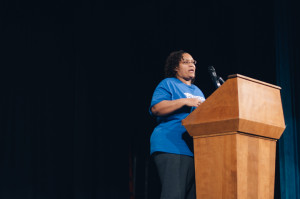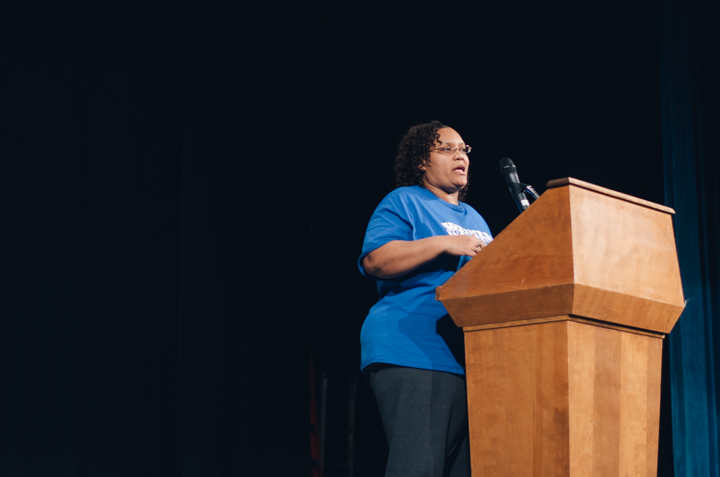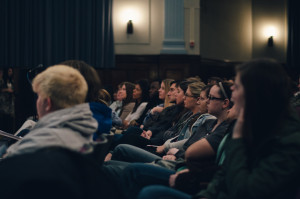By ANDREA LOPEZ and BETHANY SHERROW
Muleskinner Staff
(WARRENSBURG, Mo., digitalBURG) — Sabrina Butler, a Mississippi native, was 17 years old in 1989 when she left her sleeping son at home in his bed while she went for a jog. Twenty-seven years later, the exonerated death row survivor came to campus to share her story with the UCM community about her life experiences in and out of prison.
Approximately 800 people filled Hendricks Hall on March 2 to hear Butler speak about being wrongfully convicted of murdering her 9-month-old son.
“The purpose for bringing her to campus was to provide an opportunity for our campus and community to meet somebody who has experienced injustices in our criminal justice system,” said Ashley Wellman, UCM assistant professor of criminal justice.
Butler said when she arrived at the hospital that spring night, the doctors took her son from her, and it felt like forever before they returned to tell her that her son Walter had died.
“The first thing that came to my mind was that my son was gone and I’m in trouble,” Butler said. “But never in a million years did I think that I would be charged with murder. I thought that I would be in trouble for leaving him at the house by himself.”

PHOTOS BY RYAN BUSH / REPORTER Sabrina Butler shares her personal experience with the criminal justice system in Hendricks Hall.
Butler was wrongfully charged with capital murder. She stayed in the city jail for two weeks before being moved to the county jail. From there, she went to a mental institution where she spent eight weeks of what she calls one of the scariest times in the whole experience because of her proximity to so many criminally insane people.
“After that, I went back to the county jail where I sat a year before trial,” Butler said.
Butler said there wasn’t anybody in the courtroom to help her; they just did what they wanted. Her jury makeup consisted of two black people; the majority was white. Butler’s lawyers advised her not to take the stand.
“To sit there and be accused of killing my son was hard,” Butler said. “That was my son – I did what I could to save him.”
The jury found Butler guilty and sentenced her to death. Her date of execution was set for July 2, 1990. A month after the trial, she was transported to prison.
“When I got to prison, I had to go into intake: shackled, around my wrists, my ankles and waist,” Butler said. “They humiliate you, take off all your clothes, put bug spray in your hair, take fingerprints, take pictures. You’re no longer a human, you’re a number.”
She spent two years and nine months on death row.
“July 2 was the day that I paced the floor, listened for every chain, every sound because, I thought that was the day that I was going to die,” she said. “If it hadn’t been for the other death row inmate on the other side of me, I don’t think I would’ve made it through.”
Butler had hope when her sentence was overturned in 1992. She thought she was free, but she was sent back to county jail for another three years before her second trial.
Butler finally made headway with her case when she ended up with a new set of attorneys who proved that what Walter died of was hereditary. Her 13-year-old daughter is battling the same disease today.
“It’s been a battle because I’m pretty much going through the same thing with (my daughter),” Butler said. “Having to go to the doctors and things every three months. They say there’s nothing they can do to save her kidneys. So it’s not (like) I just stopped there.”
Butler walked out of prison as a free woman when she was exonerated Dec. 18, 1995.
While Butler said she never plans on stepping foot in a prison ever again, she continues to speak across the country to educate people about the flaws in the criminal justice system.
“I try and speak as often as I can because I want people to know that what can happen to you when you’re young and don’t understand law – they just took advantage of me,” she said. “I try to do this to bring awareness as to what’s going on in the systems. We need a change, and it’s racially biased. And that is not right, but it’s a known fact.”
When she talks on college campuses, Butler aims to speak to students who are looking to make a change in the system.
“I want people to get into some of these positions: lawyers, judges, doctors, police officers,” she said. “I want good people to get in and learn the system and know how to look for things and they can make a change. It’s a lot of corruption in politics, in death penalty, in prison systems, all of that.”
Wellman said she was thrilled with how the event went and feels that the attendees benefited from the experience.
“I think it’s important for them to learn from a human being and not just a textbook that our decisions have consequences that effect people lives,” Wellman said.
Mojdeh Khoshnavaz, senior criminal justice major, said the presentation was phenomenal and she was impressed with how openly Butler shared her story.
“I am a criminal justice student, and I know the criminal justice system has its flaws,” Khoshnavaz said. “It’s not a perfect system, and it never will be.”
Diego Ramos, a junior social work major who attended the event for an assignment in his criminal law and procedures class, said the presentation inspired him to try and make sure that what happened to Butler doesn’t happen to anyone else.
“You could feel her suffering and emotions through the way she spoke about everything that happened to her,” Ramos said. “She is a real warrior for being able to go through all of that and now after a long time being able to look back at what happen and be able to joke a little about it.”
As for now, Butler said she lives her life positively.
“Today, I live my life in bliss,” she said. “I don’t deal with a lot of people that just come and vomit their negativity. I try to live as happy as I can. The things that I took for granted when I went in are the air, the trees, the grass. It’s all beautiful.”




Leave a Reply